|
|
|
Sort Order |
|
|
|
Items / Page
|
|
|
|
|
|
|
| Srl | Item |
| 1 |
ID:
144752
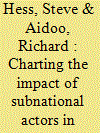

|
|
|
|
|
| Summary/Abstract |
This article discusses the efforts of a Chinese subnational government, Guangxi Province’s Shanglin County, to support local residents as they participated in galamsey, a local reference for unregistered artisanal gold mining in Ghana. This resulted in a diplomatic crisis that complicated Sino–Ghanaian relations and threatened Beijing’s efforts to access Ghana’s energy resources.
|
|
|
|
|
|
|
|
|
|
|
|
|
|
|
|
| 2 |
ID:
131242
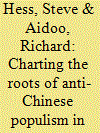

|
|
|
|
|
| Publication |
2014.
|
| Summary/Abstract |
In this article the authors conduct focused case studies on Zambia and Ghana to investigate the increasingly diverse popular reactions to Chinese engagement throughout the region of sub-Saharan Africa. In this effort they challenge the existing binary exploitation/opportunity paradigm through which growing Chinese engagement in sub-Saharan Africa is often analyzed. Instead, they propose an alternative framework, which centers less on the positive or nefarious nature of Chinese involvement and more on the institutional structures of African regimes. As opposed to closed autocracies and consolidated multiparty democracies, fluid transitional states create opportunities for the appearance of anti-Chinese populist movements akin to Michael Sata and the Patriotic Front in Zambia.
|
|
|
|
|
|
|
|
|
|
|
|
|
|
|
|
| 3 |
ID:
097146
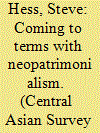

|
|
|
|
|
| Publication |
2010.
|
| Summary/Abstract |
The author examines how patrimonial forms of domination, as conceived in a Weberian sense, came to pervade the formal bureaucratic apparatuses developed under both Soviet Marxist-Leninist (from the late 1970s) and American-coalition liberal designs (since 2001), creating hybrid states defined by neopatrimonialism. Drawing lessons from the survival and eventual collapse of the Najibullah regime following the 1989 withdrawal of Soviet forces, the article finds that the continued extension of aid and arms, and not the presence of foreign military forces, proved most effectual in sustaining the Afghan leader's patronage-based grip on power. Arguing that the contemporary regime of Hamid Karzai has likewise adopted a neopatrimonial-type rule, these findings have clear implications for current American policy in Afghanistan. America, Afghanistan's ultimate patron, can better ensure stability in the region by extending aid to Karzai than by continuing a large and costly military occupation of the region.
|
|
|
|
|
|
|
|
|
|
|
|
|
|
|
|
| 4 |
ID:
091849
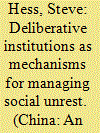

|
|
|
|
|
| Publication |
2009.
|
| Summary/Abstract |
By many indicators, 2009 should be a challenging year for the People's Republic of China. The global financial crisis sapped demand for exports and contributed to mass factory closures and layoffs, leaving an estimated 20 million migrant workers likely to lose their jobs in the year and exacerbating already wide urban/rural, east/west, and rich/poor divisions within Chinese society.
|
|
|
|
|
|
|
|
|
|
|
|
|
|
|
|
| 5 |
ID:
103142


|
|
|
|
|
| Publication |
2009.
|
| Summary/Abstract |
This work examines the labour export programme of south-west Xinjiang that brought Uyghur migrant workers to the Early Light Toy Factory in Shaoguan, Guangdong and places it in the context of capitalist-working class divisions emerging in contemporary China, where clashes between managers and workers have become frequent occurrences, and increasing worker solidarity and growing labour activism have become a leading concern of the Communist Party of China and an increasingly influential business class. The author suggests that labour export is primarily utilized not as a means to alleviate poverty and reduce minority-Han income gaps, as claimed by official sources, but as an instrument of business-class interests for dividing and conquering the shop floor through the ethnic diversification of the workforce, an age-old tactic of factory bosses harkening back to the manipulation of foreign-born workers in late-nineteenth-century industrial America.
|
|
|
|
|
|
|
|
|
|
|
|
|
|
|
|
| 6 |
ID:
146900
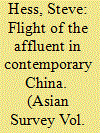

|
|
|
|
|
| Summary/Abstract |
This article investigates why a growing number of wealthy Chinese, the primary beneficiaries of China’s economic rise, have opted to exit China, through both capital flight and emigration, over the last decade, instead of using voice, engaging the political process, and leveraging their power and influence to effect policy change.
|
|
|
|
|
|
|
|
|
|
|
|
|
|
|
|
| 7 |
ID:
139669
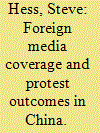

|
|
|
|
|
| Summary/Abstract |
By looking at the case of the 2011 Wukan rebellion in Guangdong Province, the following article explores the role played by foreign media in influencing the protest’s ultimate outcome: an intervention from above by provincial authorities in favour of the villagers. Placing Wukan into a four-level model incorporating local, provincial, national, and international dimensions, this article considers howWukan might serve as a model for contention that may influence future acts of popular protest in China in the digital age. It suggests that while appealing directly to foreign media can help claimants increase their leverage over local officials and prompt interventions from above, such actions are likely to modify and accelerate, but not fundamentally transform, existing patterns of localized, community-specific acts of contention seen earlier in the Reform Era.
|
|
|
|
|
|
|
|
|
|
|
|
|
|
|
|
| 8 |
ID:
100581
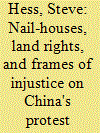

|
|
|
|
|
| Publication |
2010.
|
| Summary/Abstract |
This article highlights the way in which Chinese protestors resisting home eviction and demolition have begun to develop innovative, media-savvy tactics for winning public sympathy for their causes and framing their plights as unjust, and considers the political implications of this trend.
|
|
|
|
|
|
|
|
|
|
|
|
|
|
|
|
| 9 |
ID:
137198
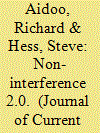

|
|
|
|
|
| Summary/Abstract |
China’s non-interference policy has come under scrutiny in regards to its growing and deepening relations in Africa. The policy has come to represent an about-face from conditional assistance and investment associated with the Washington Consensus. Although often well received in much of the global South, this policy has drawn a lot of criticism from the West and others. These commentators have perceived non-interference as an opportunistic and often inconsistent instrument for enabling China’s increasing access to African resources and markets. This article suggests that despite some consistent support for the rhetoric of non-interference, China’s implementation of the policy has become increasingly varied and context-ualized in reaction to Africa’s ever-more diversified political and economic landscape since the early 2000s.
|
|
|
|
|
|
|
|
|
|
|
|
|
|
|
|
| 10 |
ID:
172279
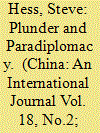

|
|
|
|
|
| Summary/Abstract |
This article conducts an investigation into Yunnan province to study the risks and opportunities associated with two institutional changes that have reshaped contemporary China: the decentralisation of power from the centre to provinces and the emerging agency of provinces in China's increasingly multilayered foreign policy. These changes have enabled Yunnan to develop a bridgehead strategy that positions the province as an economic corridor to the markets of Southeast Asia. While this has succeeded in fostering economic development, it has also created a complex set of transnational links that has contributed to the obstruction of central supervision, enabling local leaders to engage in regionalised corruption on a scale that has outpaced other Chinese provinces.
|
|
|
|
|
|
|
|
|
|
|
|
|
|
|
|
| 11 |
ID:
160305
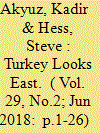

|
|
|
|
|
| Summary/Abstract |
This essay examines the impact of Turkey's growing international links to China, Russia, and other non-Western powers on democratic backsliding by the administration of Recep Tayyip Erdogan. The essay finds that China's and Russia's growing engagement with Turkey since the middle of the first decade of the 2000s, coupled with Turkey's stalled bid for European Union membership, played an important role in deleveraging Western democratizing influence on Turkey. This shift in the international balance opened a window of opportunity for the Erdogan administration to engage in backsliding activities and proved to be a more significant driver for backsliding than other common predictors.
|
|
|
|
|
|
|
|
|
|
|
|
|
|
|
|
|
|
|
|
|